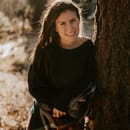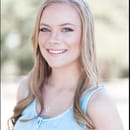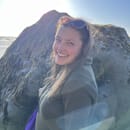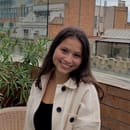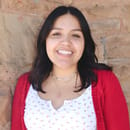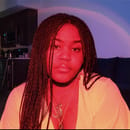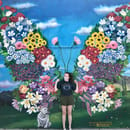We know choosing a school and a major is a huge choice for any college-bound student! We have a diverse selection of majors here at HCCU, so we decided to collaborate with one another to share our experiences across our majors for anyone wondering what it is like within some of the majors that CU offers.
- Anthropology
-
I chose my major because I was fascinated by this systematic approach to history and the many different aspects of the area of study. I have always known I wanted to study something reading-intensive and related to history, but that is also easily combined with International Affairs (my second major)! I feel that CU has helped me cultivate my interest in anthropology through its amazing variety of classes to fulfill my requirements. I have been able to study biology, history, and cultures all under the umbrella of anthropology!
My favorite class so far has been The Anthropology of the Holocaust (ANTH 4580), taught by Dr. Jacob Flaws. The class content was gruesome and often difficult to digest, but was handled delicately and with amazing attention to detail. In addition to the class content, I feel lucky to attend CU where we have access to the Harry Mazal Holocaust Archives, the world’s largest Holocaust archive. If you are fascinated by an anthropological approach to history, look no further than Norlin Library at CU Boulder.
To anyone entering the field of anthropology, I would highly recommend finding a major to pair with it. The workload is never too challenging, as anthropology intersects heavily with so many other disciplines! If you want to write, Journalism and Anthropology will help you hone those skills. If you are interested in foreign cultures and travel, International Affairs pairs very well with Anthropology! Biology, political science, and history also cross over well with the field of study. I am so lucky to have the resources and opportunities provided by CU to students of Anthropology! I can’t imagine studying anywhere else.
- Communication
-
Coming into CU Boulder, I was positive I wanted to be a communication major, but that process took a lot of deliberating before applying to college. For a long time, I thought I wanted to be a veterinarian but I soon realized that science was not for me. I have always been interested in human behavior and understanding why we do the things we do, but for the same reason that majoring in animal science didn’t work out, neither would psychology. I did some research on college majors to kind of fit my strengths and interests, and I had three options in front of me: communication, linguistics, and English. When it came down to it, I thought that communication would be the most useful major out of the three, not knowing at the time how much I would love it.
CU has an incredible communication department in its own college, the College of Media, Communication and Information (CMCI).
- Computer Science
-
Towards the end of high school, particularly the summer between junior and senior year, I spent a lot of my free time doing mini coding problems on Codecademy, a website that teaches various coding languages for free. Unlike a lot of people in my major, I didn’t start in elementary or middle school. However, I found myself coding for long periods of time and enjoying every second of it. Fast forward to college applications. As an in-state student, I wanted to go to a flagship, and given the fact that I spent all my free time coding text-based games and such, I decided to declare my major. What else would I choose? Even though coding is only a fraction of what I’ve learned in CS, it can definitely be an indicator of whether or not you’d like the major.
However, if you’re unsure, give it a shot. It’s really fun. Coming into it felt kind of weird because I felt like an idiot, lost in a lecture hall full of Mark-Zuckerburg-wannabes, but trust me, the TAs and CAs are super accommodating and nice. Intro (CSCI 1300) was extremely fast-paced when I did it (I think they may have toned it down) but it mostly introduces you to C++, so as long as you’re comfortable with an object-oriented programming language it should be a breeze. My only background knowledge was python and not once have I regretted my choice. You’ll love it.
CU’s computer science department made me interested in computer science beyond basic coding. We have classes on cybersecurity, lower-level concepts, hardware, and even human-computer interaction. I realized that there’s so much to computer science and I wanted to learn everything about it. It’s so diverse! We have professors who’ve pioneered using computing to track down pandemics like COVID. Realizing the real-life applications of everything I’ve learned is really fascinating. We host hackathons and all sorts of events, and I can’t even count how many computer science-specific clubs we have. There are a lot.
I think one of my more memorable experiences was with a few friends of mine. It was a Friday night but our project was due the next day so office hours were packed. I was super stressed because I wasn’t understanding some of the concepts but as soon as we asked questions, how the main algorithm in my project worked clicked. Since office hours ended we all walked from the engineering center to Kung Fu Tea on the hill, and I remember having so much fun that night just helping each other out. We were all doing our own thing because we had to build a game but just spending that night having a blast was really nice.
Here’s the rundown of the core classes. This might seem in-depth but I really wish I knew these coming into the major! CSCI 1300 is Starting Computing (intro). It’s mostly just learning the basics of computer science using C++. It’s all coding. The workload seems like a lot but what you’re learning is pretty easy so you’ll be fine. CSCI 2270 is Data Structures. This is such a fun class because of all the different shapes and structures involved. CSCI 2400 is Computer Systems, which involves assembly and binary which can get pretty confusing, but don’t be intimidated by the numerous Reddit posts on how hard the labs are. You’ll be fine. CSCI 3104 is Algorithms, which involves a lot of calc 2 and discrete math so get ready! CSCI 3155, Principles of Programming Languages is basically learning Scala. It’s kind of a weird language that reminds me of Java and Python but it’s not bad. CSCI 3308 is Software Development Methods and Tools. Most computer science majors want to be software engineers so please pay attention to this one!
There are two camps: people who insist that Computer Systems is harder and people who were fine in Computer Systems then die in Algorithms. It mostly depends on whether you’re better at math or coding. I found Starting Computing harder than both of those classes because of the course load but it seems that I’m the only one who thinks that so don’t worry about it!
I personally liked Data Structures more than anything else! It’s important for coding interviews too.
I have a lot of advice to give incoming computer science students.
It’s not as hard as people think or say it is.
Be prepared to do lots of math. Your calculus journey ends at calc 2, but you’re going to do lots of higher-level math.
This major goes way beyond coding so you’ll really understand computers by the end of this. I know people who ended up becoming systems engineers because lower-level stuff can be just as fun as creating websites.
Befriend your CAs or some upperclassmen! You’ll have someone to go to at the last minute when your IDE crashes 2 hours before your final project is due (true story). You’ll also have friends! Also, I personally wouldn’t use an online IDE because they seem to crash more often.
Don’t code on a tablet,
You don’t need a MacBook unless you really want to focus on apps. In which case please use a MacBook. If not I would recommend getting a PC because it’s a much better experience.
Don’t spend all of your time in the engineering center because CU has such a beautiful campus and you shouldn’t limit yourself to a single building! Yes, it’s where all your classes and office hours will be, but try to eat lunch at the UMC or study at Norlin! I made this mistake freshman year and I ended up missing out on so much.
Absolutely go out of your way to meet women, whether it’s a CS-specific club or anything else (like Her Campus)!
Don’t be afraid to ask questions. Some of these concepts can be really hard to wrap your head around so if you’re lost, so is 80% of your class.
Get an internship.
Companies look for people who do side projects. Developing games and websites are still side projects so don’t look at it as a daunting task.
If you’re considering computer science you’re probably a nerd, which isn’t a bad thing. Don’t worry about looking cool around your peers! Half the people haven’t even discovered deodorant so you do not need to dress up like Ariana Grande every day.
Dungeons and Dragons is overrated. (Not a tip, just an opinion).
Studying computer science at CU is a unique experience. First of all, you get to study with the best professors AND you’re next to the mountains. We also really emphasize inclusivity which is important given how biased artificial intelligence can be! The social life here is ~amazing~ so regardless of major you’re going to have TONS of fun.
I hope you consider it and I’ll see you around!
- English
-
I’ve always been a bookworm. I grew up in a small town where there was very little to do other than walk around a Hallmark filled with books or go to the small, local library. I prided myself on finishing books while still in the store or before even checking them out at the front desk. One of my core memories is sitting on the floor next to a ratty, old bean bag chair sobbing at the key death in “Little Women” (I promise I won’t spoil it just in case any of you are like Joey from “Friends”). In recent years, writing has become an even greater escape, the ability to write my own worlds a great avenue for expressing thoughts and ideas I struggle to articulate in an audial sense. Since enrolling in CU, the English Department has greatly helped me cultivate a more well-rounded literary taste and exposed me to works I never even knew existed. Additionally, the faculty has introduced me to scholarships and grants I never knew existed which have garnered me honors and awards that make great additions to my resume. One of my favorite classes within my major so far has been Introduction to American Women’s Literature with Professor Roschman. The works are all relatively modern and the professor is more interested in presenting excellent, popular works as opposed to overanalyzed classics seen in many other classes.
My advice for incoming English majors would be to know that discussion is a huge part of the success in this major. While your essays might make up the core of your grades, true “learning” will come from participating in your classes, engaging with your professors, and expressing ideas that inspire debate from fellow students. That’s what college is all about! In my opinion, CU’s English program is especially great because it is not one of the more “popular” disciplines. This means that the class sizes are small and the professors are extraordinarily dedicated to interacting with the English majors in their classes. It allows for a lot of one-on-one engagement, should you wish it, and encourages foundational relationships that foster mentorship.
- Finance
-
Since high school, I knew that I wanted to study business. I was in a club called Future Business Leaders of America (FBLA) and I took a few business classes in high school and I loved it. Typically, at the Leeds School of Business, you declare your emphasis in business after your sophomore year, but I found out that I could graduate a year early so I had to pick my emphasis pretty early on and I knew that finance was my cup of tea.
Through CU’s Mods, I was able to get a taste of all the areas of emphasis, but finance was the most intriguing. Since declaring my emphasis, the finance classes have proved to be rigorous and vastly different from one another. They teach real-world concepts and provide examples of typical business problems in business settings. Some of the more interesting classes I’ve taken are Corporate Finance and Investment & Portfolio Management. And yes, these classes are as hard as they sound, but they keep me on my toes and I am never bored. Since these classes are on two opposite ends of the finance spectrum, they allow me to explore different fields in finance.
To anyone who is considering majoring in business, or more specifically finance, I advise you to take advantage of all the opportunities Leeds provides. Go to office hours, attend workshops, network. There are so many professional development opportunities that are constantly offered, which may guide you to your future career in ways you don’t realize at the moment. There is nothing wrong with asking for help when you need it.
- International Affairs
-
Growing up, nothing fascinated me more than the idea of the world around us. I never failed to question how it could be so full of so much. My time was equally split between Mexico and the United States as a child, and the two dichotomies of my life filled my head with so much wonder. I spent so much of my time looking at maps, reading books from countries all over, and most importantly, I would constantly compare the way each of these countries looked at the rest.
Now, I’d be lying if I said I was always sure my major would be International Affairs because that is just not the case. Many career paths crossed my head. I wanted to be a lawyer, and then a psychiatrist, and then a lawyer again, and then a teacher, and then I realized that none of those filled my heart with joy. I loved every subject, but I was only exposed to those like history, science, math, and literature, and I never explored beyond that. When it was time to apply to college, answering the “Select major you are applying for” category filled my heart with dread because I just had no idea.
So I searched in my memory, looking for what made my heart full. The answer wasn’t easy to find. I thought about my two homes growing up, and every map stored in a drawer. I thought about how my goal was to truly inspire change everywhere I could. I thought about every place I one day wanted to visit, and how the way they all connected made my mind explode. Despite the answer being so close, it still didn’t cross my mind that IAFS was the major for me.
My best friend and I came to the Conference of World Affairs here at CU in the following weeks, and I remember one panelist describing the emotions that led to her career using words drastically similar to mine. At the end of the event, I approached her. She told me she had majored in IAFS right here at CU. Suddenly, the answer was so clear. I spent the entirety of my night researching their program, and it all fell into place. CU has truly shown that it’s the place to study IAFS, from their connections to departments like the US Department of State to their incredible Study Abroad program.CU has continued to make this experience worthwhile because they constantly host events with people who are actively working in the foreign diplomacy field. The professors are beyond knowledgeable and experienced, and a multitude of class requirements from economics, to politics and more, truly enrich the career path preparing you for everything any part of the world might hold. What I like the most about it is that despite only being able to pick one language and one area as your focus, the requirements of the major ensure that you are well-educated in all regions of the world.
My favorite classes here at CU have been “Introduction to International Relations” with Svetoslav Derderyan and “Global Issues and International Affairs” with David Bearce. Both of these classes were taught in the following way: they looked at events that had happened, the policy that led to it, the policy that came from it, and what was next. I found this to be really meaningful because it answered the “why” behind the “what,” and created a very valuable path for action.
If you’re thinking about picking IAFS as your major, there are a few things you should know. The first, and most important one, is that you need to come into classes with an open mind. Growing up, we are exposed to a very specific worldview, because the majority of it exists only in one place. IAFS will look at many, and each one will continue to blow your mind. Do not reject the things you will learn, because they are what will make your education worthwhile. The second piece of advice is nearly as important as the first, and it will definitely save your life a couple of times. Go talk to your professors. Go to office hours. Form connections with them. These are the people who have specialized and spent plenty of hours researching the field you are interested in. The knowledge they have gained can only help your future, and they are always willing to share what they know. Reaching out will also help you understand the content better, and your grades will thank you. The last thing you should know if you plan to study IAFS is that you should be as versatile, rounded, and involved as this field is. The world is always changing, and hence, so is this field. Adapting to new things, exploring clubs related to the part of it that fascinates you the most, and continuously staying informed on what is going on around us is just as, and maybe even more important as the classes themselves.
CU is a wonderful place to study IAFS. Internship programs, study abroad, CU in DC, experienced professors and a plethora of connections make it such an enriching, in-depth program with many opportunities to be successful in it.
- Journalism
-
I always knew I was going to be a writer. Ever since I could pick up a pencil, I was journaling, writing scripts for pretend news shows, and even drafting my very own column called “Kelley’s Column” (yes, very original). Therefore, I knew journalism was the place for me. CU Boulder has an amazing journalism program, so I am blessed to have had the opportunity to stay close to my hometown of Longmont, Colorado.
Throughout my four years at CU Boulder, I have never strayed away from my dream of becoming a journalist, but I did fine-tune the route in which I was going to take my career. Everyone thought I was going to be a newscaster. My friends and family pushed me towards the broadcast route, but I found very quickly I was incredibly camera shy. I was lucky to have found this out after joining the Buff Sports Live club on campus and quickly changed over to the print side within my classes and extracurriculars.
With that, CU has provided so many opportunities for me to develop my interest as a journalist, and I am graduating with 100% confidence in my career. CU allowed me to pursue my career in a professional setting through internships and even in my classes. As I started taking my upper-division courses, my professors were helping me get my work published in local newspapers, and the CU Abroad Program even landed me an internship with an Irish sports magazine amidst a pandemic. I highly recommend taking Feature Writing with Hillary Rosner and Opinion Writing with Chuck Plunkett if you want to pursue the print side of journalism.
The most important piece of advice I would give you (if you decide to declare journalism as your major) is to stick with it. Yes, it’s not going to be easy. You will be working long nights, talking to a lot of people in interviews, and will receive a lot of criticism for your work. But, one day, you might see your name in a professional publication and a check in your hand. That will be the day it all becomes worth it. I know so many people who dropped journalism in their first year before they could even make it to the fun classes! If you know you want to be a writer or a reporter when you graduate, CU will make it happen. Trust the process and work hard.
- Linguistics
-
I chose to study linguistics after previously studying to become a Spanish teacher. When I wasn’t feeling 100% satisfied in that career, I started thinking about how much I still loved the language, the connections between Spanish and other languages, and I was introduced to the field of linguistics as a way to hone in on my passions. CU was the perfect place for me to study because of the diversity of areas of study within the field: we have professors who specialize in syntax, phonetics, cognitive linguistics, machine learning, Indigenous languages, and language preservation, as well as conversation and discourse analysis. This made it really easy for me to find out what I was most interested in researching.
Classes for linguistics majors include foundational courses and then choosing a track which are in four groups: computational linguistics, which is related to computer programming; language and cognition; sociocultural, anthropological, and interactional linguistics; and the TESOL track, or Teaching English as a Second Language. Additionally, we are required to take courses or prove we are proficient in a language other than English. Among my classmates, we represent so many different languages from around the world like ASL, Portuguese, Russian, Hindi, Japanese, Mandarin, and more.
A minor in Linguistics involves fewer classes, but the research and content of the courses are so helpful for gaining new understanding in majors like Psychology, Speech and Hearing Science, Neuroscience, Computer Science, Anthropology, Ethnic Studies, and likely others, too. Our professors are world-class and they would be so great to talk to if you were interested in learning about how humans learn to speak, why do people from Canada sound like that, and to compare different types of conversations you have every day. Linguists work in all sorts of job markets from politics to Duolingo and I’m looking forward to seeing the mark that Buffs from our department will continue to leave on the world.
- Music
-
I fell in love with playing the flute when I was in middle school. By the start of my senior year of high school, I knew I didn’t want to give up my passion for music when I came to college, so I decided to audition for the flute studio at CU. The audition process was a little daunting, but all of the current students and faculty members were so supportive throughout the whole day.
Being a part of the College of Music has been such a rewarding experience. I’m surrounded by people who share my passion, I’ve connected with incredible professors, and I’m constantly inspired by the talents of my peers. The College of Music also has a lot of opportunities available for students. I’ve participated in masterclasses, attended guest concerts, and played commissioned pieces in the band, unique opportunities that I’m so grateful for.
The College of Music is also supportive of whatever else you want to pursue outside of music. I’m a double major, and my music advisor has been so helpful for me in balancing my music classes with my classes for my other major. Ultimately, the faculty just wants you to be a well-rounded musician and student, which makes CU really stand out compared to other music schools. I’m so glad I was able to be a part of the College of Music because my music classes have definitely been a highlight of my time at CU so far.
- Neuroscience and Psychology
-
I always knew I wanted to end up in science, but the road I took to my end majors was wild! I started wanting to study immunology, then microbiology (learned I had to take physics and noped out of that), and ended up in Neuroscience. I actually added Psychology on a whim because I wanted to take the Psychology Statistics course and ended up liking it as a compliment to my neuro degree!
CU has been the best place for me to pursue neuroscience in the capacity I wanted to. I was able to find professors who I admired and adored, and I eventually found a research lab to be involved with and my passion for neuroscience skyrocketed! My lab became my happy place, my support group, and the place for me to pursue my curiosities. I have an amazing PI who supported my passions for alcohol research and provided me with the lab space to start pursuing a project that would eventually become 2 years of my life and my honors thesis basis. The experience has been the most challenging thing I have literally, ever done, but has also been the most rewarding and pushed me to grow as a scientist.
Honestly, I have had a love-hate relationship with all of my classes because I have loved everyone, but each has challenged me in different ways. Every professor I have had is an expert in their field which is amazing to be exposed to their knowledge, but also challenging when I wanted to understand every concept thoroughly and didn’t realize just how widespread that would take my knowledge. If I had to choose two, I think my favorite was Dr. Ryan Bachtell’s “Neurobiology of Addiction” mixed grad/undergrad course, and Dr. Jennifer Schwartz’s “Abnormal Psychology” course. Though I highly recommend Bioethics for any science major :)
My advice would be to pursue what you are passionate about and talk to your professors about their research. These are amazing people who are experts in their field, and almost literally give off their knowledge if you simply give them a chance to. When I took this approach to interacting with my professors, I was able to develop amazing relationships, and learn so much information about the field, politics within the field, research drama, and I got to see them through their passions as researchers and as people. It was an amazing experience, and when you allow yourself this space you will find amazing connections within this major. (Though they did all terrify me at the beginning!)
I would say that my research experience has made my time studying neuroscience at CU unique. My lab has the funniest conglomerate of researchers with diverse backgrounds and a love for research. They have challenged me to be the best I could be, and I am the woman I am today in part to them. They provided a community that strove for excellence and also kindness within a world that can be cutthroat. I am so happy that I chose CU for these experiences, and I encourage anyone who is interested in neuroscience to consider CU as well.
- Philosophy
-
When it came down to choosing my major, I had a pretty clear idea of what I wanted to study. I’ve wanted to be a human rights attorney since middle school so I knew that it would be beneficial to pursue a major that allowed me the flexibility to specialize in any field of law when the time came. Philosophy was the best choice for me because I loved the idea of trying to find answers to questions that didn’t have easy ones. By coming to CU I was able to stay close to my family which made the decision even better.
The philosophy department at CU has some of the best instructors and professors I’ve ever met. The professors sparked my interest with their seemingly unsolvable questions and out-of-the-box answers. They’ve taught me so much about arguments and looking past the superficial to the crucial details. What I’ve learned has also become a part of my daily life and always piques my interest. I’ve noticed that I’ve started to look for philosophical examples in my day to day and embracing that, so I have CU to thank for exposing me to a whole new way of thinking.
What makes studying philosophy at CU unique is that the professors are genuinely there to teach you. They don’t try to trick you or make things more difficult just for the sake of it. They’ll be there to help you understand the material and won’t shame you for not getting something right on the first try. Plus, they actively engage with you and try to make things easier because, let’s face it, some philosophical problems are wildly complex and don’t have straight answers. Another part is the variety of philosophy courses offered at CU. Along with the basics, the university offers interdisciplinary courses that cover philosophy with race, engineering, history, law, sports, psychology, religion, politics, and many many more. There’s always something new to learn within the department.
- Political Science
-
As a kid, I aspired about helping people. I knew that someday I am going to be named Attorney Guevara, and I am going to get to help people in the way I know best, through the law. Applying to universities was easy for me because at every school I blindly put Political Science, Government, etc, but no-brainer decisions can turn into mindless situations real fast.
Political Science is a major filled with questions to discuss, not solve; and although that was my dream as I was finishing up my last math courses in high school, having your mind run in circles about the politics of people’s varying right to life is so equally exhausting. It took me one semester of being a Political Science major in college to seriously consider changing my degree to Business. However, with my whole heart, I’ll say that transferring to CU Boulder is the only thing that made me fall in love with the subject again.
As someone who’s taken courses at a few universities and colleges because I was an overachiever (a nerd) in high school, I’ve had quite a few different professors educate me on political subject areas. At CU Boulder, I have never had professors be so passionate and excited to teach what they do. One of the Political Science professors of Gender Law, and other sex and gender/law and policy-related courses, is one that I’ll say has definitely made a difference for me and my learning experience. She made learning remotely so easy and effortless, I was able to focus on the material actually being taught. She walks her students through topics, as she talks about them in real-world dilemmas and situations, making the capacity of each topic come off as that much more important.
The Political Science department is also filled with some of the most compassionate students I’ve had the opportunity to learn with. At the school I attended before, politics was more about how to work your way up and gain power. Here at Boulder, politics are about what is happening to people and what we as the people can and will do about it. I’ve had the opportunity, through the Political Science department, to find a spot for me on Capitol Hill as a Senate Intern, a dream nine-year-old me could only see in the sunkissed horizon.
I wanted to study Political Science because I always thought that would be my best chance at getting to help and represent people when they need it most. I quickly realized that Political Science is not always about helping, it’s about understanding why people need help and listening to what they say they need. Boulder allowed me to find my passion again, and for that, I am both so excited and grateful.
If you can’t sit idle in a world where so much needs to be done, CU Boulder’s Political Science program will allow you to find your voice and uplift others to find theirs.
We hope this sampling of just a few of the many majors offered at CU helped you to gain persepctive on the amazing opportunities CU Boulder has to offer! With so many areas of study and professors to help you grow as a student and professional, we are certain you will find your place and your passion at CU.


